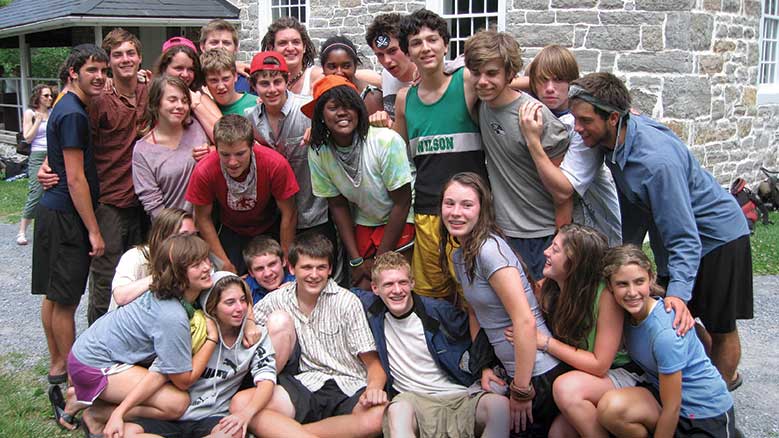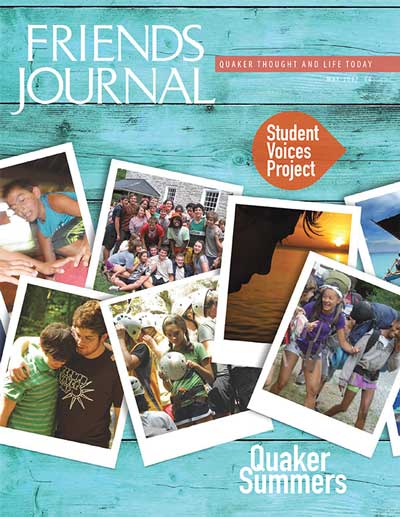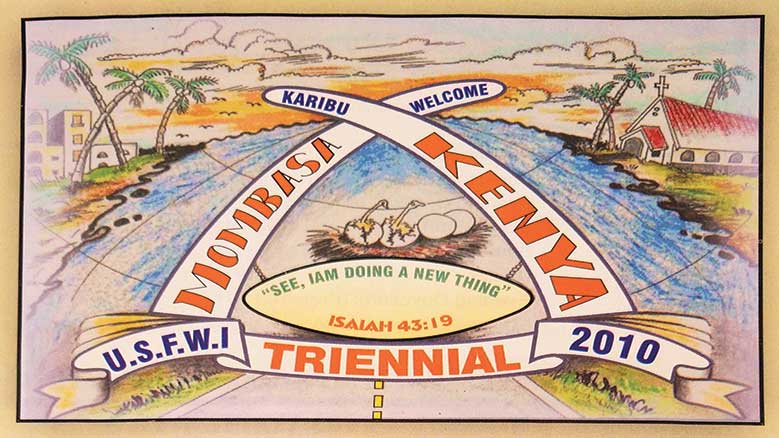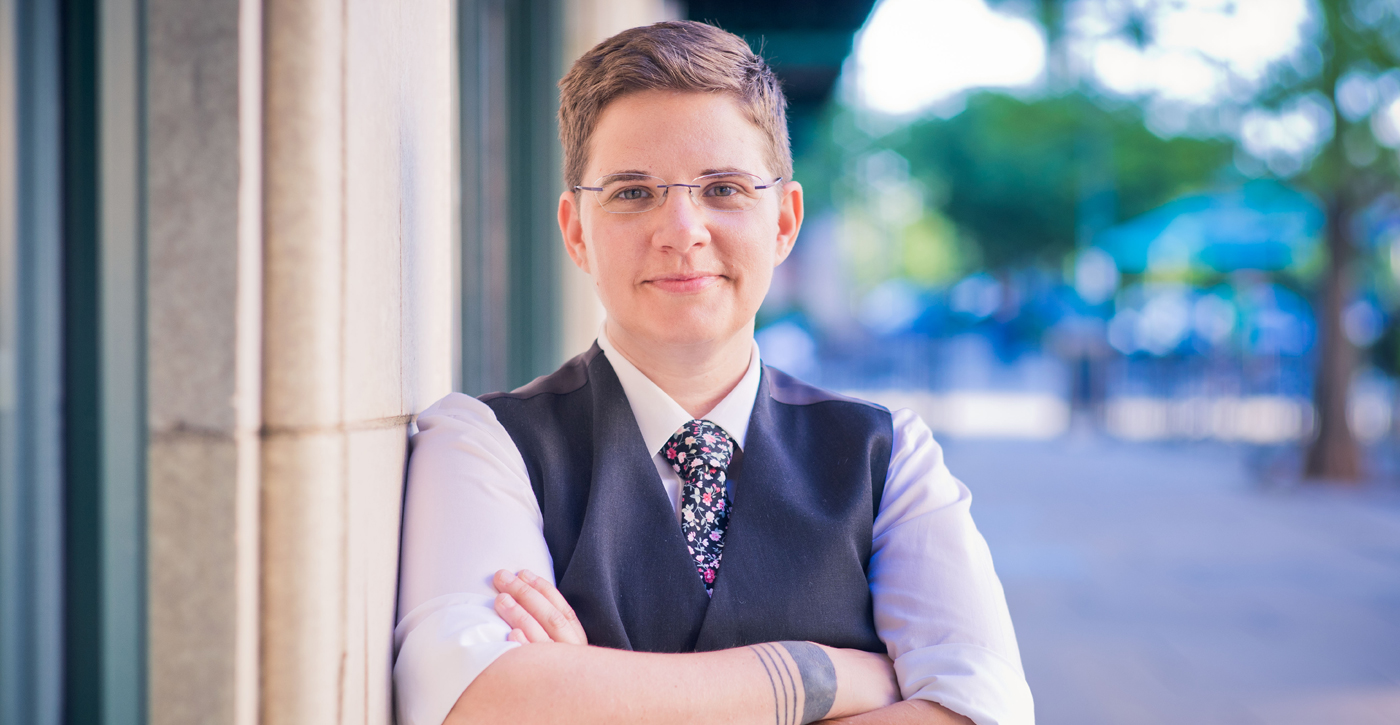Growing Diverse Leadership in Baltimore Yearly Meeting

Yearly meetings are places full of formative experiences. From our youth programs to our Sunday worship, from support committees to retreats, people of all ages grapple together with the big questions of life. But what shape do we take when we form ourselves, our communities, and our next generation of leaders in spaces that do not fully represent the diversity of people around and among us?
That is the question that first struck me as a young person of color in Baltimore Yearly Meeting’s camping program, and the one that eventually led to the Growing Diverse Leadership Program. This is BYM’s new initiative to increase the participation, equity, and quality of experience of people of color and young adults in the camps, monthly meetings, and BYM as a whole.
Camp provided a life-changing environment for me. It was a space that fostered close friendships, modeled great leadership, allowed me to build confidence, and helped me develop a sense of myself. But each of those experiences happened in a place where the friendship, leadership, gifts, and perspectives of people of color were not prevalent. I had the sense even then that there was something happening at camp that was very powerful but also incomplete.
As I grew older, I realized that this interaction was absent in many spaces in the world. And it was affecting all people, not just me or just people of color. We live in a country that is rapidly becoming more diverse, and in a world where the big challenges of the day—issues like global warming, inequity, prejudice, police brutality—cannot be solved by any one group. Studies show that the average white American lives in an environment that is 79 percent white. Similarly, the segregation index for the top six most populous areas for African Americans is 80 on a scale of 100, 100 being complete segregation. Asian American segregation has actually increased in the last decade. Isolation is worse in schools, where 80 percent of Latino students and 74 percent of black students attend majority nonwhite schools. Over half of those schools have less than 10 percent white students. These divisions are often caused by, accompanied by, and perpetuate other forms of inequity.
As we live out our values, it is crucial for our formative spaces to be ones that draw on all strengths and perspectives. Our leadership opportunities must foster skills and engage a wide variety of people. A 2014 study by the Kirwan Institute for the Study of Race and Ethnicity has shown, for instance, that “intergroup contact in collaborative settings where groups have equal status and support from authorities” can reduce subconscious bias. (Such bias can be seen in the amount of time a doctor spends with an ailing patient or the speed with which an officer uses deadly force.) A community that has genuine diversity and equity is not just icing on the cake; it is at the core of creating the world we want. We have an amazing opportunity to form together rather than apart. Many people and committees within BYM have worked toward this goal independently, and now the Growing Diverse Leadership Initiative provides additional attention and opportunity.
The Growing Diverse Leadership Initiative
For the past six years, a group of young adult BYM camp alumni have been engaged in STRIDE (Strengthening Transformative Relationships in Diverse Environments), a working group for increasing diversity, inclusion, and dialogue at Catoctin Quaker Camp in Thurmont, Maryland. The Growing Diverse Leadership Initiative was launched with a grant from the Shoemaker Foundation and has expanded the STRIDE model to new working groups in Baltimore; Washington, D.C.; and soon Charlottesville, Virginia.
To that end, there are five main principles, which can be applied to many environments, such as local meetings, committees, and events at yearly meetings. While this initiative is focused specifically on engaging more fully with people of color and young adults, many of these principles would be useful with other identities and communities as well.
1. Relationships
Within the STRIDE groups, people connected to BYM recruit through individuals and organizations with which they are already associated. This enables people who are a good fit to link to camp through someone they trust. We also try to invite people to camp in pairs or as cohorts, so it’s not just one person from a community. Regular events during the year keep campers’ families and community partners connected. We are clear that this is not charity but rather that everyone benefits from the STRIDE families’ contributions and from being part of a diverse camp community. As such, we work together to make that happen for all of us.
In local meetings, members could invite people by hosting, for example, a “friend of a Friend” event. Meetings might foster relationships with organizations with similar interests by supporting their initiatives. They can also create opportunities for preparation and follow-up and invite a couple of people from a particular community so no one has to come alone.
2. Practical Support and Inclusion
Lack of Internet access, camping gear, transportation, and tuition can create barriers for some families. The STRIDE groups provide loaner gear, rides, and computer access, and they also fundraise tuition. Though not required, families participating in the STRIDE program are invited to (and often do) contribute to these activities as they are able. This allows us to work together and helps to break down the power dynamic inherent in a relationship of “giver” and “receiver.” It is also important to note that not all families of color need monetary assistance and not all access issues faced by people of color are financial in nature.
Meetings could likewise provide rides, childcare, and language access. Events could be held at different times of day and in spaces where people of color aren’t afraid of being targeted.
3. Preparation, Self-reflection, and Ongoing Communication
STRIDE members prepare participants by taking a practice hike where the future campers learn camp songs and games, and talk about what to expect. Group members also help recruit staff applicants for a diverse pool from which the best leaders will be hired. During pre-camp training, staff examine their own identities and learn to support campers with various backgrounds. During and after the summer, feedback sessions are conducted with staff and families, and assessments of procedures and practices are made.
Many of these procedures can be transferred directly from the camp model to meetings:
- creating a diverse pool of committee nominees
- committing to diversity when selecting clerks, committee members, and leaders
- expecting cultural fluency to be part of the skill set of those in leadership roles
- committing to dealing with issues and seeing them as learning opportunities
- creating opportunities for members to find common ground and share talents
- regularly assessing the inclusivity of events, special groups, activities, and the general running of the meeting or committee
4. Flexibility and Creativity
STRIDE group members recognize that equality does not mean that everyone gets the same thing; instead, everyone gets what they need. Oftentimes, the accommodations we make for one person end up benefiting others as well. We have found it useful to change small things—sometimes related to diversity and sometimes not—before a specific need arises, so that the change isn’t pinned to any particular individual or group. This, too, can be a good policy for meetings.
5. Commitment
To have campers feel full ownership in the camp community, STRIDE groups commit to supporting them throughout their entire time at BYM camps (up to eight years), and also to continuing to support their leadership. This commitment entails following up on challenges, hurts, miscommunication, and subconscious bias. We’re open to feedback and take an interest in campers and their families beyond the summer.
Meetings can support people at various stages of their involvement: whether attending, participating, feeling ownership, or (if they so choose) leading. Talking with new and existing members about the pivotal moments of transition between these levels of involvement can be instructive. Feeling supported as individuals beyond meeting activities can also help create a sense of community, and builds the trust and goodwill necessary to handle hard interactions should they occur. Cooking for a new parent, visiting a sick attender, or showing up for someone’s important performance, for instance, can make a big difference. Because issues of diversity and equity can be hard to face alone, creating regular opportunities for assessment and discussion supports us in doing this important work together.
The Call, the Ability, and the Opportunity
Creating communities of genuine diversity and equity is a complex, ongoing process that is far from done in BYM camping programs or elsewhere. With this effort comes the humility of knowing that there is always more to learn and discover. But by committing to these principles, STRIDE groups have been able to make tangible progress. Now the Growing Diverse Leadership Program is helping meetings in BYM establish Change Groups, which will similarly reflect and act upon these principles. The process itself transforms many group members.
Living the Truth of Our Testimony on Equality, produced by a committee of Friends General Conference, states “racism, bias, and privilege among Friends . . . affects our spiritual progress both as individuals and as a religious society.” So too does our work to undo and heal these problems. Our faith provides us not only the call to live in right relation to each other but also the ability and opportunity to put that call into action. In so doing, we strengthen our spiritual core. I invite you to follow that call and bring your unique gifts and skills to this work in your meeting, or in any other community that has formed you, so we might all shape our full humanity together.








Lots
Thanks Dyresha, not only for the invitation to do more than contemplate the problem, not only permission to act but the program and the very steps needed to move forward if we dare.
For many of us (500) Friends, that attended the White Privilege Conference, the question of what now and how, is nicely laid out. And yes, there are many groups who could bring spiritual gifts, most needed by Friends just now.
Thanks, Emily Boardman (NYYM IAC Clerk)